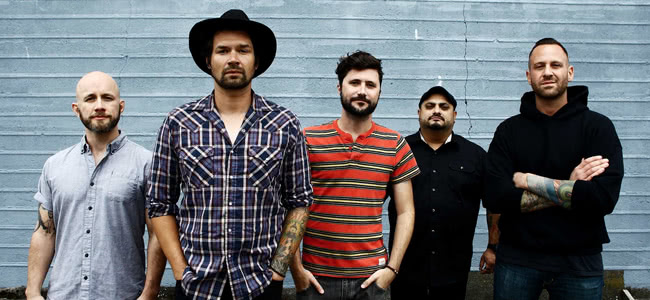Today marks the release of the Long Island rockers’ hotly anticipated seventh album, and it displays every bit of the reinvention and raw punch keeping the group alive and kicking for 17 years.
The record is also the first time the five-piece have written while recording in the studio, and as frontman Adam Lazzara explains, “We could come up with an idea, perform it and then listen back to it immediately instead of feeling boxed in by what we did on demos.”
The band certainly don’t feel boxed in from the get-go. The atmospheric wall of sound on album-opener ‘Death Wolf’, complete with a brief wash of synth and light guitar, suddenly opens into a blistering riff and Lazzara’s powerhouse vocals. It’s an awesome way to kick-start the record, featuring an incredibly cool drum breakdown and distorted bass.
Title track ‘Tidal Wave’ actually brings that surf rock sound to the record, and easily has the strongest punk vibe. While Lazzara’s punchy vocals keep pace with the frantic rhythm of guitarist Eddie Reyes, it’s the feeling of desolation against that upbeat energy that encapsulates the entire album.
It’s on Tidal Wave’s slowest tunes, though, where the group really shine. Simple instrumentation and a cleaner guitar sound contrast perfectly with Lazzara’s anthemic vocals on ‘You Can’t Look Back’, while the haunting, lyric-driven ‘I Felt It Too’ takes you back to that time you were sitting alone on a cloudy day, contemplating the world.
Songs like ‘Fences’ and ‘Call Come Running’ show how seamlessly the band can cut through their massive wall of sound, particularly as John Nolan rips into his guitar solo on the latter track. It’s also on the second half of the record where his vocals really kick into gear. Eighth tune ‘Holy Water’ displays the versatility of his range as he suddenly goes from low to high, searing to lilting.
Then the rhythmic prowess of drummer Mark O’Connell takes over on ‘In The Middle Of It All’, and the depth of wailing guitar sets an interesting tone as the band’s sonic experimentation comes to the fore. This dissipates into nothingness, leaving you hungry for more.
Soon we hit the most emotional part of the record with ‘We Don’t Go In There’, bringing the sense of being trapped inside your own head, while not being able to claw your way out. The acoustic elements certainly add a different layer to the album, before kicking into the group’s fuller sound. Then the unexpectedly heart-warming ‘Homecoming’ hits, well, home, conjuring images of being around a campfire with your mates.
The album’s orchestral touch contributes heavily to the overall sonic experience, with the strings on ‘Fences’ bringing a different vibe underscored by that signature feeling of melancholy. That feeling finds its way onto the record’s final track ‘I’ll Find A Way To Make It What You Want’, and it’s one that really synthesises the band together. From Lazzara’s beautifully hoarse vocal to low piano chords set against distorted guitars, and a huge drum sound from O’Connell (truly tying the record together), it’s a closer that will leave you unresolved yet satisfied.
Taking Back Sunday’s Tidal Wave will send your emotions crashing all over the place, and in the best possible way. Grab the album and take yourself on a spiritual journey, available to unlock here.




































